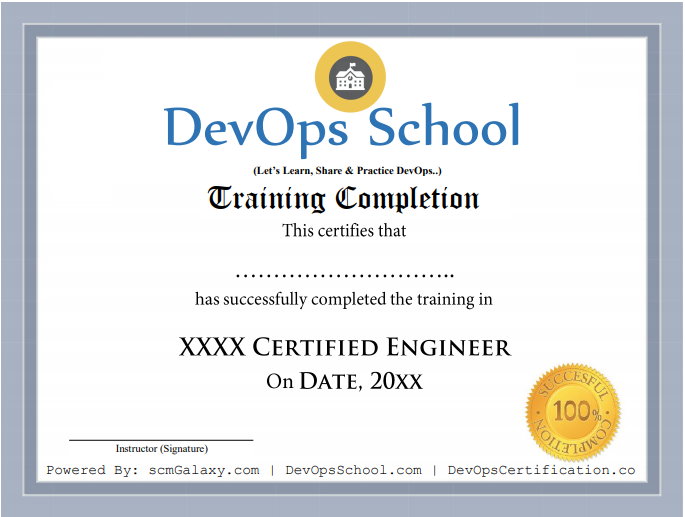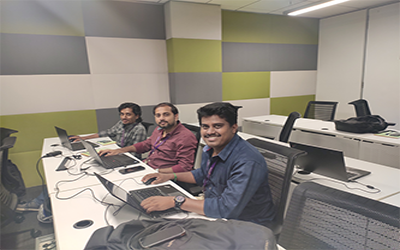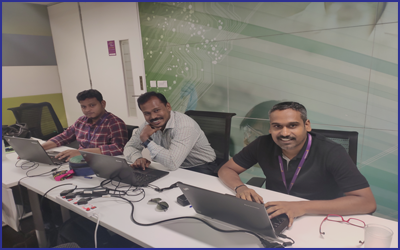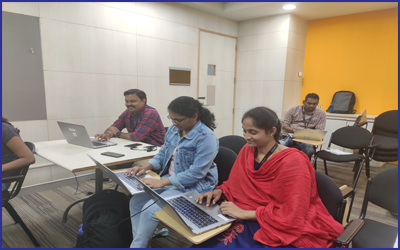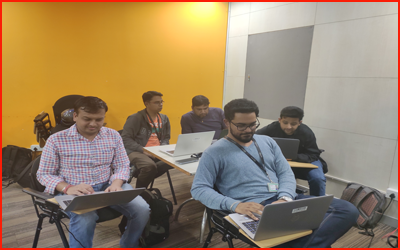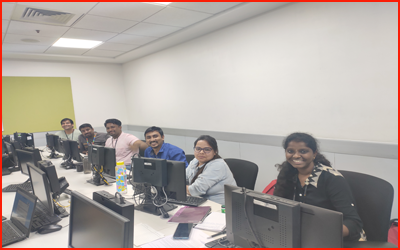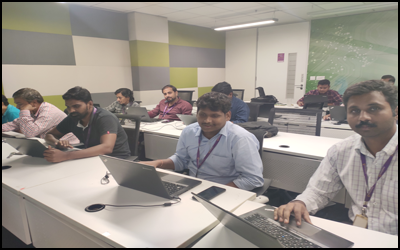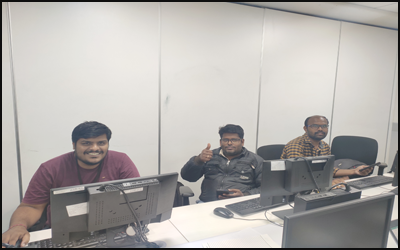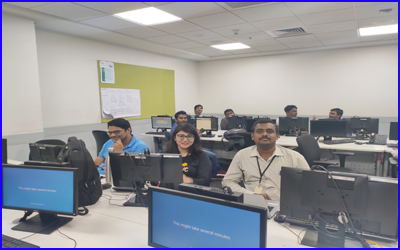DevSecOps Foundation Certification
Course Duration
5 Days
Live Projects
NA
Certification
Industry recognized
Training Format
8000+
Certified Learners
15+
Years Avg. faculty experience
40+
Happy Clients
4.5/5.0
Average class rating
What is DevSecOps Foundation Certification?
DevSecOps Foundation Certification is a specialized credential designed for professionals seeking to enhance their understanding of DevSecOps, a critical aspect of modern software development and IT security practices. DevSecOps stands for Development, Security, and Operations, and it integrates security practices within the DevOps pipeline. The goal of DevSecOps is to ensure that security is a part of the development process from the very beginning, rather than being an afterthought. The certification focuses on embedding security practices into the entire software development lifecycle (SDLC), promoting collaboration between development, operations, and security teams.
The DevSecOps Foundation Certification equips IT professionals with the foundational knowledge and skills necessary to implement security best practices within DevOps processes. This certification provides an understanding of key concepts such as continuous integration and continuous delivery (CI/CD), automated security testing, vulnerability scanning, and monitoring in the DevOps environment. By achieving this certification, professionals demonstrate their ability to bridge the gap between development, security, and operations to create secure and reliable applications.
Why DevSecOps Foundation Certification is important
The importance of the DevSecOps Foundation Certification lies in the increasing need for robust security measures in the fast-paced world of DevOps. Traditional security methods often operate in silos, separate from development and operations, which can result in vulnerabilities being overlooked or discovered too late in the development lifecycle. In contrast, DevSecOps focuses on proactively addressing security from the outset, allowing organizations to build secure applications more efficiently.
-
Rising Security Concerns: As organizations increasingly adopt cloud technologies and continuous integration/continuous delivery (CI/CD) pipelines, the complexity of securing applications and infrastructure has grown. Security breaches, data leaks, and other cyber threats are more prevalent than ever, making it essential for organizations to embed security throughout the development lifecycle. A DevSecOps Foundation Certification prepares professionals to address these challenges by integrating security into DevOps processes.
-
Improved Collaboration: DevSecOps fosters collaboration between developers, security experts, and operations teams. This certification helps professionals understand how to work together to ensure security requirements are met without slowing down development. By embedding security within the development process, teams can reduce friction and improve workflow efficiency.
-
Career Growth: As the demand for DevSecOps professionals continues to rise, those who possess the Foundation Certification are more likely to be seen as valuable assets to organizations looking to implement or improve their security practices. The certification not only demonstrates competence in secure software development but also signals a commitment to staying current with industry best practices.
-
Cost and Risk Reduction: Addressing security early in the development process through DevSecOps minimizes the likelihood of costly and time-consuming security issues later on. By identifying vulnerabilities early on, organizations can avoid significant costs related to fixing issues post-deployment and can better manage the overall risk.
-
Alignment with Industry Standards: The DevSecOps Foundation Certification aligns with industry best practices and frameworks such as the National Institute of Standards and Technology (NIST) Cybersecurity Framework, the ISO 27001 standard, and others. Having this certification ensures that professionals are knowledgeable about established security frameworks and methodologies.
Course Feature
The DevSecOps Foundation Certification course is designed to provide participants with comprehensive knowledge and practical skills related to integrating security into the DevOps pipeline. Some of the key features of the course include:
-
Comprehensive Curriculum: The course covers fundamental aspects of DevSecOps, including secure coding practices, vulnerability management, threat modeling, automated security testing, and compliance. The curriculum ensures participants gain an in-depth understanding of how to apply security within DevOps practices.
-
Hands-On Experience: The course provides practical, hands-on labs and exercises that enable participants to practice what they learn in a real-world environment. Learners will gain experience with the tools and technologies used in DevSecOps, such as continuous integration/continuous delivery (CI/CD) tools, security scanning tools, and monitoring systems.
-
Industry-Relevant Content: The course content is regularly updated to reflect the latest trends and challenges in the DevSecOps space. Participants will be exposed to best practices and industry standards that are currently in use across top organizations and industries.
-
Instructor-Led Training: The course is taught by experienced instructors who are experts in the field of DevSecOps. These instructors bring real-world experience and case studies to the training, offering valuable insights into how to tackle common challenges faced during the integration of security in DevOps.
-
Certification Exam Preparation: The course is structured to ensure participants are well-prepared for the DevSecOps Foundation Certification exam. It includes practice questions, quizzes, and mock exams designed to test knowledge and understanding of the core concepts taught throughout the training.
-
Lifetime Access: Upon completion, participants receive lifetime access to course materials, allowing them to revisit content whenever needed and stay updated with new developments in DevSecOps.
Training objectives
The primary goal of the DevSecOps Foundation Certification course is to equip learners with the skills necessary to integrate security into every phase of the DevOps pipeline. The training objectives include:
-
Understanding DevSecOps Principles: Participants will gain an understanding of what DevSecOps is, its principles, and how it relates to DevOps and traditional security practices. They will learn how security can be integrated into development and operations without slowing down the process.
-
Security in the SDLC: The course will cover how security is embedded into each phase of the Software Development Life Cycle (SDLC), including design, development, testing, deployment, and monitoring. Participants will learn how to implement secure coding practices and integrate automated security tests into CI/CD pipelines.
-
Automated Security Testing: A key component of DevSecOps is automating security testing to identify vulnerabilities early. Participants will learn how to integrate security testing into CI/CD pipelines, using tools like static application security testing (SAST), dynamic application security testing (DAST), and software composition analysis (SCA).
-
Vulnerability and Threat Management: The course will cover how to manage vulnerabilities and threats throughout the development and deployment process. Participants will learn how to identify and address security risks and ensure compliance with relevant regulations and standards.
-
Monitoring and Incident Response: DevSecOps also emphasizes continuous monitoring of applications and infrastructure for potential security issues. The course will cover techniques for monitoring, logging, and responding to security incidents in a DevOps environment.
Target Audience
The DevSecOps Foundation Certification course is suitable for a wide range of professionals involved in the development, security, and operations of software applications. Specific target audiences include:
-
DevOps Engineers: Professionals working in DevOps who wish to expand their skills in integrating security into their workflows.
-
Security Engineers: Those responsible for the security of applications and infrastructure who want to understand how to embed security practices into DevOps processes.
-
Software Developers: Developers who want to learn how to write secure code and ensure that security is a part of the development process.
-
IT Operations Teams: Individuals working in IT operations who need to understand how to secure the cloud infrastructure and environments they manage.
-
System Administrators: Those who manage systems and applications and want to learn how to secure the systems they are responsible for.
-
Cybersecurity Professionals: Security specialists who want to integrate security practices into DevOps pipelines to mitigate risks during the software delivery process.
-
Aspiring DevSecOps Professionals: Individuals seeking to transition into a DevSecOps role or build a career in the integration of development, security, and operations.
Training Methodology
The training methodology for the DevSecOps Foundation Certification is designed to provide a balanced mix of theory and practical application. The approach includes:
-
Instructor-Led Sessions: Classroom-based or virtual instructor-led training sessions that provide foundational knowledge and practical insights into DevSecOps practices.
-
Hands-On Labs: Participants gain real-world experience through lab exercises where they apply what they’ve learned to solve security problems within a DevOps pipeline.
-
Interactive Discussions: Group discussions, case studies, and group exercises that help reinforce key concepts and allow participants to share experiences and insights.
-
Continuous Assessment: Regular assessments, quizzes, and mock exams to help track progress and reinforce learning.
-
Real-World Scenarios: The course includes real-world examples and case studies to illustrate how DevSecOps is applied in various organizational contexts.
Training Materials
The course is supported by a comprehensive set of training materials that help participants absorb and apply what they learn. These materials include:
-
Courseware: Detailed slides, notes, and reference documents that cover all the key topics of DevSecOps.
-
Tool Access: Participants have access to DevSecOps tools such as Jenkins, Docker, Kubernetes, and various security scanning tools, providing them with the hands-on experience needed to implement security within a DevOps environment.
-
Practice Exams: Mock exams and quizzes that simulate the real certification exam and help participants assess their readiness.
-
E-Books and Articles: Downloadable materials, such as e-books and articles, that dive deeper into advanced topics within the DevSecOps field.
-
Instructor Support: Ongoing support from instructors during and after the course to clarify doubts and guide participants through complex concepts.
Instructor-led, Live & Interactive Sessions
DURATION |
MODE |
LEVEL |
BATCHES |
COURSE PRICE AT |
|---|---|---|---|---|
5 Days |
Corporate (Online/Classroom) |
DevSecOps Foundation Certification |
Corporate Batch |
Contact US |
How to contact DevOpsSchool :
+1 (469) 756-6329
Contact@DevopsSchool.com
DevopsSchool.com
+91 99057 40781
AGENDA : DEVSECOPS FOUNDATION CERTIFICATION Download Curriculum
SL |
Method of Training and Assesement |
% of Weightage |
|---|---|---|
1 |
Understanding the problems |
5% |
2 |
Concept Discussion |
10% |
3 |
Demo |
25% |
4 |
Lab & Exercise |
50% |
5 |
Assessments & Projects |
10% |
OUR COURSE IN COMPARISON
| FEATURES | DEVOPSSCHOOL | OTHERS |
|---|---|---|
| Lifetime Technical Support | ||
| Lifetime LMS access | ||
| Interview-kit | ||
| Step by Step Web Based Tutorials | ||
| Training Slides |
- Students should have Adobe Photoshop installed on their computers to follow along.
- You are a video creator
- You might know how to edit with Final Cut, iMovie, Sony Vegas, Premiere Elements, Windows Movie Maker, Camtasia, Screenflow, etc. But you want to transition to editing with Photoshop.
- You are a complete beginner who has never opened Photoshop
- You have played around with Photoshop, but need some help becoming a more efficient editor.
Weekdays - Live Class Schedule
| Day | IST (India) | PST (USA) | EST (USA) | CET (Europe) | JST (East Asia) |
|---|---|---|---|---|---|
| Monday | 9:00 PM - 11:00 PM | 7:30 AM - 9:30 AM | 10:30 AM - 12:30 PM | 4:30 PM - 6:30 PM | 12:30 AM - 2:30 AM (Tuesday) |
| Tuesday | 9:00 PM - 11:00 PM | 7:30 AM - 9:30 AM | 10:30 AM - 12:30 PM | 4:30 PM - 6:30 PM | 12:30 AM - 2:30 AM (Wednesday) |
| Wednesday | 9:00 PM - 11:00 PM | 7:30 AM - 9:30 AM | 10:30 AM - 12:30 PM | 4:30 PM - 6:30 PM | 12:30 AM - 2:30 AM (Thursday) |
| Thursday | 9:00 PM - 11:00 PM | 7:30 AM - 9:30 AM | 10:30 AM - 12:30 PM | 4:30 PM - 6:30 PM | 12:30 AM - 2:30 AM (Friday) |
Weekends - Live Class Schedule
| Day | IST (India) | PST (USA) | EST (USA) | CET (Europe) | JST (Asia) |
|---|---|---|---|---|---|
| Friday | 9:00 AM - 11:00 AM | 7:30 PM - 9:30 PM (Thursday) | 10:30 PM - 12:30 AM (Thursday/Friday) | 4:30 AM - 6:30 AM (Friday) | 1:30 PM - 3:30 PM (Friday) |
| Saturday | 9:00 AM - 11:00 AM | 7:30 PM - 9:30 PM (Friday) | 10:30 PM - 12:30 AM (Friday/Saturday) | 4:30 AM - 6:30 AM (Saturday) | 1:30 PM - 3:30 PM (Saturday) |
| Sunday | 9:00 AM - 11:00 AM | 7:30 PM - 9:30 PM (Saturday) | 10:30 PM - 12:30 AM (Saturday/Sunday) | 4:30 AM - 6:30 AM (Sunday) | 1:30 PM - 3:30 PM (Sunday) |
DEVSECOPS CERTIFICATION
What are the benefits of DevSecOps Foundation Certification?
Certifications always play an important role in any profession. It is considered as one of the best way to determine one’s credibility and worth in the professional career. The same thing is applicable in DevOps, if you are a certified SRE professional then you will get certain benefits:
- DevSecOps Foundation Certification assure recruiters that the SRE professional whom we are going to hire have the skills, knowledge, and competency to perform the responsibilities what expected from them after hiring.
- SRE as a technology is dominating the job market. SRE engineer ranks #2 on Glassdoor's best jobs rankings. The role of SRE certified professional has seen a 200% jump in postings on indeed" according to SD times report
- This certified course helps anyone who aspires to make a career as a SRE professional.
- SRE Certified Engineer is one of the most highly paid job roles in the world. Pay scale even for junior level SRE practitioner is quite high.
- According to indeed and other job portals, 80% of the companies pay more than $90000 starting salary to a SRE Certified Professionals. Also, 35% pay at least $115000 and 17% more than $125000
- Obviously there are several factors which affects salary for like geography, skills, company, it varies accordingly. In Cities like Bangalore/Hyderabad SRE Certified Professional can expect - INR 3,25,672 - 19,42,394 which is not at all a bad package.
- SRE is going to stay here for long time. Therefore organizations and as well as professionals need to change as they have no choice but to evolve. If they will evolve then then demands of certified professionals will definitely increase and the sooner you do it, the sooner you will be in a leading position.
View more
FREQUENTLY ASKED QUESTIONS
After the training each participant will get LIFETIME ACCESS of our Learning Management System (LMS) where you will get materials in the form of Class recordings, Notes, PDF slides, Web reference step by step guide, questions and answers, test module, exercise and sample projects.
Yes, All of our training demo and lab would be done in AWS cloud platform where we can save lots of time for setting up the infrastructure for demo and lab. Our trainer also designed the course for quick learning and grasping method.
Yes, Snacks and Lunch would be served at training venue free of cost from our end.
Yes, we have DevOpsSchool forum. After the training you may post your issues and Instructors would reply you within 24 hours.
After successful completion of our SRE workshop in Bangalore, every participants would be awarded with SRE certificates approved by DevOpsSchool and DevOpsCertification.co Certification program which is industry recognized and does holds high value.
Once you make the payment based on the given instructions, you will receive the joining KIT within 12 hours.
ONLINE TRAINING REVIEWS

Abhinav Gupta, Pune
(5.0)The training was very useful and interactive. Rajesh helped develop the confidence of all.

Indrayani, India
(5.0)Rajesh is very good trainer. Rajesh was able to resolve our queries and question effectively. We really liked the hands-on examples covered during this training program.

Ravi Daur , Noida
(5.0)Good training session about basic SRE concepts. Working session were also good, howeverproper query resolution was sometimes missed, maybe due to time constraint.

Sumit Kulkarni, Software Engineer
(5.0)Very well organized training, helped a lot to understand the SRE concept and detailed related to various tools.Very helpful

Vinayakumar, Project Manager, Bangalore
(5.0)Thanks Rajesh, Training was good, Appreciate the knowledge you poses and displayed in the training.

Abhinav Gupta, Pune
(5.0)The training with DevOpsSchool was a good experience. Rajesh was very helping and clear with concepts. The only suggestion is to improve the course content.


